
Imbolc or Imbolg, also called Saint Brigid's Day, is a Gaelic traditional festival. It marks the beginning of spring, and for Christians, it is the feast day of Saint Brigid, Ireland's patroness saint. Its traditional date is 1 February, about halfway between the winter solstice and the spring equinox. Historically, its traditions were widely observed throughout Ireland, Scotland and the Isle of Man. Imbolc is one of the four Gaelic seasonal festivals, along with: Beltane, Lughnasadh and Samhain.
A leap year is a calendar year that contains an additional day compared to a common year. The 366th day is added to keep the calendar year synchronised with the astronomical year or seasonal year. Since astronomical events and seasons do not repeat in a whole number of days, calendars having a constant number of days each year will unavoidably drift over time with respect to the event that the year is supposed to track, such as seasons. By inserting ("intercalating") an additional day—a leap day—or month—a leap month—into some years, the drift between a civilization's dating system and the physical properties of the Solar System can be corrected.

Palm Sunday is the Christian moveable feast that falls on the Sunday before Easter. The feast commemorates Christ's triumphal entry into Jerusalem, an event mentioned in each of the four canonical Gospels. Its name originates from the palm branches waved by the crowd to greet and honor Jesus Christ as he entered the city. Palm Sunday marks the first day of Holy Week; in Western Christianity, this is the beginning of the last week of the solemn season of Lent, preceding Eastertide, while in Eastern Christianity, Holy Week commences after the conclusion of Great Lent.
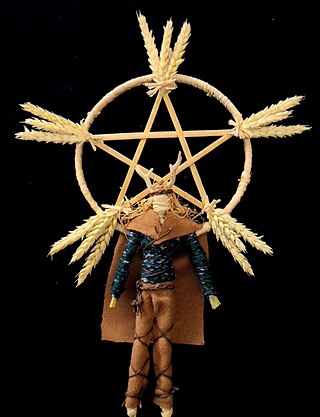
Lughnasadh, Lughnasa or Lúnasa is a Gaelic festival marking the beginning of the harvest season. Historically, it was widely observed throughout Ireland, Scotland, and the Isle of Man. Traditionally, it is held on 1 August, or about halfway between the summer solstice and autumn equinox. In recent centuries, some celebrations have shifted to Sundays near this date. Lughnasadh is one of the four Gaelic seasonal festivals, along with Samhain, Imbolc, and Beltane. It corresponds to the Welsh Gŵyl Awst and the English Lammas.
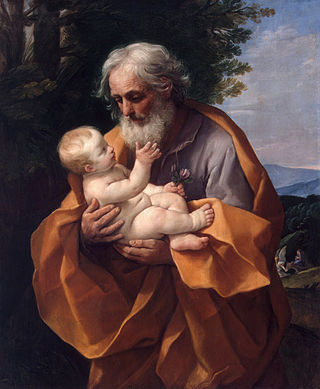
Saint Joseph's Day, also called the Feast of Saint Joseph or the Solemnity of Saint Joseph, is in Western Christianity the principal feast day of Saint Joseph, husband of the Virgin Mary and legal father of Jesus Christ, celebrated on 19 March. It has the rank of a solemnity in the Catholic Church. It is a feast or commemoration in the provinces of the Anglican Communion, and a feast or festival in the Lutheran Church. Saint Joseph's Day is the Patronal Feast day for Poland as well as for Canada, persons named Joseph, Josephine, etc., for religious institutes, schools and parishes bearing his name, and for carpenters. It is also Father's Day in some Catholic countries, mainly Spain, Portugal, and Italy. It is not a holy day of obligation for Catholics in the United States.

Shrove Tuesday is the final day of Shrovetide, marking the end of pre-Lent. Lent begins the following day with Ash Wednesday. Shrove Tuesday is observed in many Christian countries through participating in confession; the ritual burning of the previous year's Holy Week palms; finalizing one's Lenten sacrifice; as well as eating pancakes and other sweets.
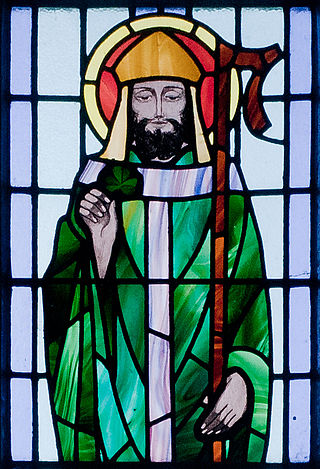
Saint Patrick's Day, or the Feast of Saint Patrick, is a religious and cultural holiday held on 17 March, the traditional death date of Saint Patrick, the foremost patron saint of Ireland.

Saint Brigid of Kildare or Saint Brigid of Ireland is the patroness saint of Ireland, and one of its three national saints along with Patrick and Columba. According to medieval Irish hagiographies, she was an abbess who founded the important abbey of Kildare, as well as several other monasteries of nuns. There are few documented historical facts about her, and her hagiographies are mainly anecdotes and miracle tales, some of which are Christianisations of hero tales from Irish mythology. They say Brigid was the daughter of an Irish clan chief and an enslaved Christian woman, and was fostered in a druid's household before becoming a consecrated virgin. She is patroness of many things, including poetry, learning, healing, protection, blacksmithing, livestock and dairy production. In her honour, a perpetual fire was kept burning at Kildare for centuries.
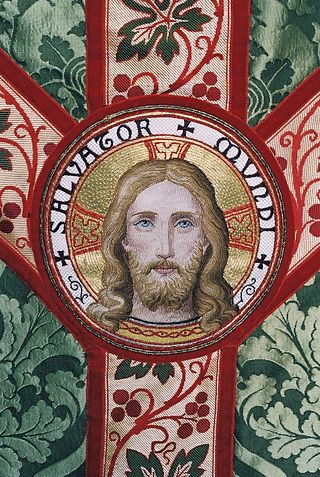
Ordinary Time is the part of the liturgical year in the liturgy of the Roman Rite, which falls outside the two great seasons of Christmastide and Eastertide, or their respective preparatory seasons of Advent and Lent. Ordinary Time thus includes the days between Christmastide and Lent, and between Eastertide and Advent. The liturgical color assigned to Ordinary Time is green. The last Sunday of Ordinary Time is the Solemnity of Christ the King.

Sadie Hawkins Day is an American folk event and pseudo-holiday originated by Al Capp's hillbilly comic strip Li'l Abner (1934–1977). The annual comic strip storyline inspired real-world Sadie Hawkins events, the premise of which is that women ask men for a date or dancing. "Sadie Hawkins Day" was introduced in the comic strip on November 15, 1937; the storyline ran until the beginning of December. The storyline was revisited the following October/November, and inspired a fad on college campuses. By 1939, Life reported that 201 colleges in 188 cities held a Sadie Hawkins Day event.

Brian Merriman or in Irish Brian Mac Giolla Meidhre was an 18th-century Irish language bard, farmer, hedge school teacher, and Irish traditional musician from rural County Clare.

Spinster or old maid is a term referring to an unmarried woman who is older than what is perceived as the prime age range during which women usually marry. It can also indicate that a woman is considered unlikely to ever marry. The term originally denoted a woman whose occupation was to spin. The closest equivalent term for males is "bachelor" or "confirmed bachelor", but this generally does not carry the same connotations in reference to age and perceived desirability in marriage.
In legal definitions for interpersonal status, a person who is single is an individual not in a committed relationship, married, or part of a civil union.
A pattern in Irish Roman Catholicism refers to the devotions that take place within a parish on the feast day of the patron saint of the parish, on that date, called a Pattern day, or the nearest Sunday, called Pattern Sunday. In the case of a local folk saint from Celtic Christianity, there may be archaeological remains traditionally associated with the saint, such as holy wells reputed to have healing powers. Often the parish priest will say Mass or lead prayers at such a site, sometimes processing between several locations. In some parishes, Pattern Sunday coincides with Cemetery Sunday, an annual ancestor veneration observance held in cemeteries which typically includes the cleaning and decoration of family graves as well as religious rituals.

A marriage proposal is a custom or ritual, common in Western cultures, in which one member of a couple asks the other for their hand in marriage. If accepted, it marks the initiation of engagement, a mutual promise of later marriage.

Malanka is a Ukrainian folk holiday celebrated on 31 December, which is New Year's Eve in accordance with the Gregorian calendar, formerly it was celebrated on 13 January corresponding to 31 December in the Julian calendar. The festivities were historically centred around house-to-house visiting by groups of young men, costumed as characters from a folk tale of pre-Christian origin, as well as special food and drink. The context of the rituals has changed, but some elements continue to the present.
In Chinese tradition, a ghost marriage refers to a marriage in which one or both parties are deceased.

Carnival in French Guiana is a major event. Its style is described as Afro-Caribbean. A moveable holiday, it takes place between Epiphany and Ash Wednesday, ending on Mardi Gras. Known internationally for its Paré-masqué balls and its emblematic character, the Touloulou, it is considered the longest carnival in the world.
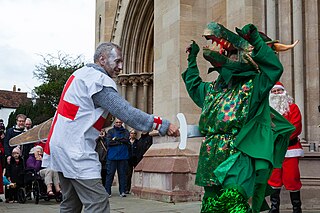
Mummers' plays are folk plays performed by troupes of amateur actors, traditionally all male, known as mummers or guisers. Historically, mummers' plays consisted of informal groups of costumed community members that visited from house to house on various holidays. Today the term refers especially to a play in which a number of characters are called on stage, two of whom engage in a combat, the loser being revived by a doctor character. This play is sometimes found associated with a sword dance though both also exist in Britain independently.















